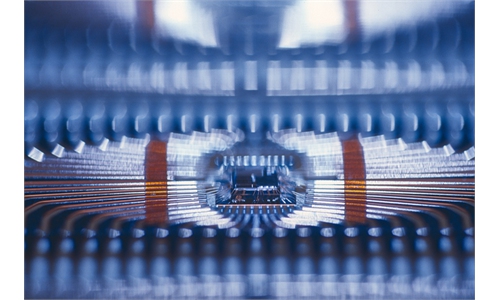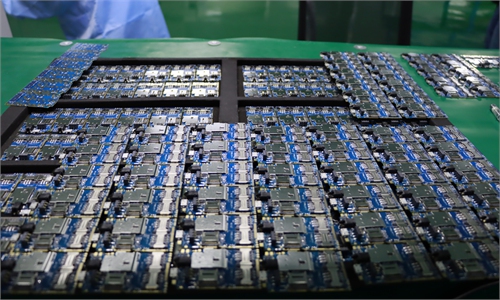Germany stops Chinese chip firm's acquisition bid
Political meddling to impact Birlin’s global competitiveness: expert

Photo:VCG
The German authorities on Wednesday took a sudden U-turn by stopping a Chinese chip firm's acquisition bid in Germany. Experts said the move reflected internal political discord in the German government, and they urged the German side to increase its understanding of China and the Chinese market so as to elevate Germany's global competitiveness.
Chinese chip company Sai MicroElectronics said on Thursday that its Sweden-based wholly-owned subsidiary Silex Microsystems AB had received an official document from German authorities that prohibited its acquisition of Elmos Semiconductor SE's auto chip line in Dortmund, Germany.
"Due to the prohibition, the deal that had been drawing to a close cannot be completed. The companies involved in the deal will carefully analyze the decision received, and have decided to take further action," the company said in a statement to the Shenzhen Stock Exchange.
Sai MicroElectronics deeply regrets the decision of the German Federal Ministry of Economics and Climate Action, but it is "still optimistic" about the prospects of the auto chip industry and will continue to attach importance to the industrial layout, it said.
The result came as a shock to the companies involved, as the ministry had indicated an approval subject to conditions and submitted a draft version of the approval after about a 10-month review process, according to a separate statement by Elmos.
In December 2021, Silex and Elmos signed an agreement to transfer the Elmos wafer fabrication at the Dortmund location to Silex at a net purchase price of 85 million euros ($85 million).
"The unwise decision reflects the concerns of some German politicians due to their lack of understanding of China and Chinese companies," Fu Liang, an independent tech analyst, told the Global Times on Thursday.
As Chinese companies give increasing attention to the global market, they will continuously increase investment in Germany for sustainable development in its car market rather than to transfer technologies or production to China, experts said.
Fu said Germany's move will undoubtedly affect the global competitiveness of Germany's semiconductor and automobile sectors. "The promising automobile electronics sector should have been an opportunity for both China and Germany. Politicizing economic cooperation may lead to a supply crunch, as seen at the height of the COVID-19 outbreak," he said.
The transfer of new micromechanics technologies from Sweden and significant investments in the Dortmund location would have strengthened semiconductor production in Germany, according to Elmos.
China always encourages its businesses to conduct mutually beneficial investment cooperation overseas in accordance with market principles and international rules as well as local laws and regulations, Chinese Foreign Ministry spokesperson Zhao Lijian told a regular press conference on Wednesday.
"We hope that Germany and other countries will provide a fair, open and non-discriminatory market environment for Chinese companies doing business there, and refrain from politicizing normal economic and trade cooperation, still less using national security as a pretext to practice protectionism," he stressed.
The ban reflects the ascendency of the coalition government faction that takes a hard-line stance toward China, as there have been disputes within the government about German Chancellor Olaf Scholz's recent trip to China, Cui Hongjian, director of the Department of European Studies at the China Institute of International Studies, told the Global Times on Thursday.
"Germany aims to maintain a certain balance in cooperation with China," Cui said. Advanced technology related to national security and high value-added industries will be subject to scrutiny, while cooperation that helps German companies profit from the large Chinese market will be encouraged, Cui added.
Chinese firms don't need to retreat amid these challenges, as Germany's policies toward China may change from time to time, given internal disputes within the German government, Cui noted.


